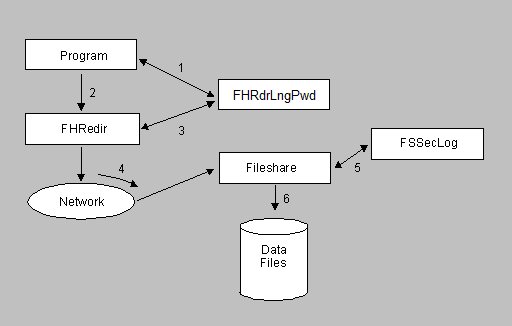Introduction
If you have not activated the Fileshare Password System, the Fileshare Server validates requests to log on by calling the Fileshare Security Logon validation module (FSSecLog).
The FSSecLog module supplied with Fileshare allows any Fileshare Client to log on to a Fileshare Server. If you need to restrict the Fileshare Clients that can log on to a Fileshare Server, you must provide your own, alternative, FSSecLog module for the Fileshare Server to call.
For example, your own module can enable integration with the native operating system security, if this is needed.
The sequence of steps that your program and Fileshare follow is:
- Your program registers a user-ID and password by calling the File Handling Redirector password module (FHRdrLngPwd or FHRdrPwd)
- Your program performs the first I/O operation
- The File Handling Redirector module obtains the user-ID and password registered in step 1 by calling its password module (FHRdrLngPwd or FHRdrPwd)
- The File Handling Redirector module passes the user-ID and password to the Fileshare Server
- The Fileshare Server calls the FSSecLog module passing the user-ID and password
- If the FSSecLog module allows logging on, a connection is established between the Fileshare Client and the Fileshare Server. If the FSSecLog module does not allow logging on, a status 9/037 "access denied" is returned to the Fileshare Client.

Syntax:
call "fsseclog" using user-ID
password
return-status
Parameters:
- user-ID
- pic x(100).
- password
- pic x(100).
- return-status
- pic x comp-x.
Note: The FHRdrLngPwd module also requires the
user-ID and
password parameters to be defined as pic x(100) to support long usernames and passwords.
On Entry:
- user-ID
- The Fileshare Client's user-ID
- password
- The Fileshare Client's password
On Exit:
- user-ID
- Unchanged
- password
- Unchanged
- return-status
- Set to 0 if the Fileshare Client is allowed to log onto the Fileshare Server. Any other status indicates the Fileshare Client is not allowed to log on and an error is returned to the Fileshare Client.










Comments:
Windows:
To use your own fsseclog module, create and link it into cobfssecurity.dll and place it on the search path, PATH. Fileshare will notify you that it has loaded the user security modules.
UNIX:
To use your own fsseclog module, create and link it into a cobfssecurity shared object and place it on the search path, LD_LIBRARY_PATH (or LIBPATH on AIX platforms). Fileshare will notify you that it has loaded the user security modules.